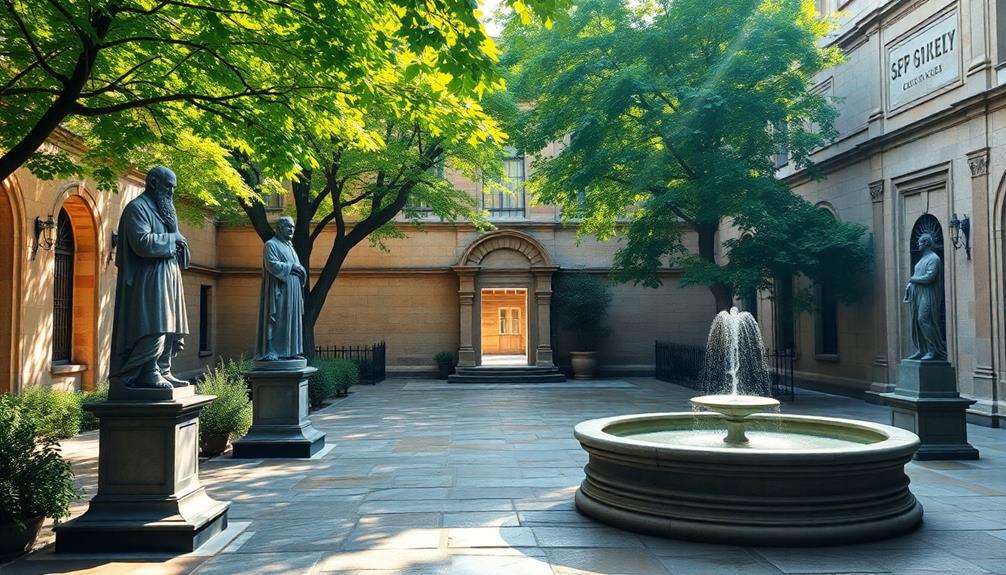Suspending judgment forms the core of ancient skepticism, prompting you to challenge conventional beliefs about knowledge and certainty. Key figures like Pyrrho of Elis and Sextus Empiricus advocate for a thought process that prioritizes tranquility through non-commitment and inquiry. You'll encounter two main branches: Pyrrhonian skepticism, which seeks mental calm by withholding judgment, and Academic skepticism, focusing on the limits of certainty. By exploring diverse perspectives and evaluating conflicting impressions, you can achieve a clearer understanding of your thoughts and experiences. Keep going, and you'll uncover how these ideas resonate with contemporary issues today.
Key Takeaways
- Ancient skepticism emphasizes suspending judgment to achieve mental tranquility and navigate uncertainty without dogmatic beliefs.
- Pyrrhonian skepticism promotes ataraxia through non-commitment to beliefs, fostering a calm mindset amidst conflicting information.
- Academic skepticism engages in dialectical debates, questioning the certainty of knowledge and prioritizing convincing impressions for decision-making.
- Key figures like Pyrrho and Carneades championed the importance of evaluating conflicting impressions to reach practical conclusions.
- The practice of epoché encourages critical examination of beliefs, highlighting the subjective nature of knowledge claims and human cognition limitations.
Defining Ancient Skepticism
Ancient skepticism offers a profound exploration of knowledge and belief. At its core, it's about suspending judgment on knowledge claims instead of hastily affirming beliefs. This approach reflects a critical inquiry into the nature of knowledge, emphasizing the limitations of human understanding, much like the way energy-efficient appliances can reduce overall energy consumption by questioning traditional practices.
Central to this philosophy are the two main forms: Academic skepticism and Pyrrhonian Skepticism. While Academic skeptics, tied to the Platonic Academy, question certainty, Pyrrhonian skeptics focus on achieving practical neutrality amidst conflicting beliefs.
You'll find that ancient skeptics like Pyrrho of Elis and Sextus Empiricus advocated for a thoughtful suspension of judgment to avoid dogmatism. They believed that by recognizing the limitations of sensory perceptions, you could achieve a state of tranquility known as ataraxia. This tranquility arises from accepting uncertainty and distancing yourself from rigid beliefs.
The criterion of truth in ancient skepticism involves evaluating conflicting impressions to guide your actions based on plausibility rather than absolute certainty. In this way, ancient skepticism invites you to navigate the complexities of knowledge with an open mind, fostering a deeper understanding of the world around you.
Key Figures in Skepticism

When exploring key figures in skepticism, you can't overlook Arcesilaus and Carneades.
Arcesilaus challenged the idea of certain knowledge, emphasizing a methodical approach to understanding that resonates with modern practices in software quality assurance.
Carneades introduced the practical criterion "to pithanon," emphasizing the role of convincing impressions in decision-making.
Their contributions shaped the direction of Academic Skepticism and influenced later philosophical thought.
Arcesilaus and Academic Skepticism
Arcesilaus, a pivotal figure in the development of Academic Skepticism, reshaped the Platonic Academy into a hub of critical inquiry and doubt. He argued against the possibility of certain knowledge, advocating for suspending judgment on all propositions.
Through dialectical debates, you'd see him present equally compelling arguments for and against various positions, effectively highlighting the uncertainty of knowledge claims. His emphasis on maintaining positive energy and setting clear intentions in one's pursuit of understanding mirrors the Abraham's Business Success Principles, which encourage a mindset focused on growth and inquiry.
Challenging the Stoics, particularly Zeno of Citium's idea of kataleptic impressions as a foundation for knowledge, Arcesilaus asserted that such certainty is unattainable. His Socratic method encouraged you to examine your own beliefs, emphasizing that the pursuit of truth requires acknowledging the limitations of human understanding.
Arcesilaus' legacy set the stage for future skeptics, establishing a foundational approach to Academic Skepticism that prioritized inquiry and debate over dogmatic assertions.
Carneades' Practical Criterion
Building on the foundation laid by Arcesilaus, Carneades emerged as a significant figure in Academic Skepticism, introducing the practical criterion known as "to pithanon." This concept emphasizes that while absolute truths may be elusive, convincing impressions can serve as valuable guides for action.
In the context of contemporary learning, AI-Powered Virtual Reality in E-Learning illustrates how technology can enhance engagement and personal decision-making. Carneades challenged the Stoics' belief that knowledge is attainable through kataleptic impressions, arguing instead that certainty in knowledge claims is fundamentally unattainable.
His method involved presenting equal arguments for and against various positions, which encouraged you to engage in suspending judgment. By doing so, you maintain a more neutral cognitive state, allowing for practical reasoning to take center stage in decision-making.
Carneades' dialectical strategies particularly impacted ethical discussions, revealing how skepticism can influence moral beliefs and practices. Ultimately, his work highlights the necessity of steering through everyday decisions through the lens of practical criterion rather than seeking absolute certainty.
This approach not only deepens your understanding of skepticism but also equips you with the tools to discern which impressions merit your trust, guiding your actions amidst uncertainty. Carneades' influence on philosophy reveals the lasting relevance of skepticism in your pursuit of knowledge and ethical living.
Pyrrhonian vs. Academic Skepticism

When you compare Pyrrhonian and Academic skepticism, you'll notice they both question the nature of knowledge but approach it differently.
Pyrrhonian skepticism prioritizes tranquility through the suspension of judgment, which can be likened to the calming effects of aromatherapy that promote emotional well-being and reduce anxiety, as demonstrated by various essential oils the benefits of aromatherapy.
On the other hand, Academic skepticism engages in systematic debate about knowledge's limitations.
Exploring their core principles, historical development, and practical implications reveals how these two schools of thought shape philosophical discourse.
Core Principles Comparison
Both Pyrrhonian and Academic skepticism offer unique approaches to understanding knowledge and belief, yet they diverge markedly in their core principles.
Pyrrhonian skepticism emphasizes the suspension of judgment on all matters, advocating for a neutral stance and non-commitment to any beliefs. This approach aims for ataraxia, or mental tranquility, by living according to appearances rather than making definitive claims. In today's fast-paced technological landscape, where Microsoft outage can disrupt our reliance on digital tools, the importance of questioning our assumptions becomes even more relevant.
In contrast, Academic skepticism, particularly as articulated by Arcesilaus, focuses on the unattainability of certainty and engages in dialectical methods to argue both sides of a proposition. While Pyrrhonian skeptics seek to avoid definitive stances, Academic skeptics actively challenge dogmatic beliefs and assert that knowledge is impossible.
Moreover, Carneades introduced the idea of "to pithanon," which centers on convincing impressions guiding practical living. This contrasts sharply with the broader suspension of judgment characteristic of Pyrrhonian skepticism.
Despite these differences, both forms of skepticism share a common goal: questioning the validity of knowledge and beliefs, highlighting the limitations of human understanding, and fostering critical inquiry into the nature of certainty.
Historical Development Overview
The historical development of Pyrrhonian and Academic skepticism reveals distinct paths in the evolution of philosophical thought. Pyrrhonian skepticism, founded by Pyrrho of Elis, emphasizes suspending judgment regarding everything. By avoiding dogmatism, it seeks tranquility and encourages you to focus on immediate experience rather than theoretical claims. This approach resonates with the idea of recognizing and addressing signs of running dry, as it promotes an awareness of personal limits and an understanding of one's immediate condition.
In contrast, Academic skepticism, influenced by Arcesilaus and Carneades, critically evaluates knowledge claims, arguing that true knowledge is unattainable. Arcesilaus challenged the Stoics, advocating for the equal consideration of opposing arguments, while Carneades introduced the practical criterion of "to pithanon," which helps you navigate everyday decisions based on convincing impressions.
While both schools of ancient skepticism examine the limits of certainty, their methods diverge. Pyrrhonian skeptics prioritize personal experience and practical decision-making, whereas Academic skeptics engage in systematic arguments against established beliefs. This differentiation highlights the broader philosophical discourse about knowledge and belief.
Together, these schools shaped the way later thinkers approached uncertainty and the pursuit of truth, laying the groundwork for future philosophical inquiry. Ultimately, understanding these paths enriches your appreciation of how ancient skepticism continues to influence contemporary thought.
Practical Implications Explored
Skepticism's practical implications can greatly impact how you approach decision-making and navigate everyday challenges. By adopting Pyrrhonian skepticism, you learn to suspend judgment on various matters, allowing you to focus on immediate experiences rather than getting bogged down by abstract claims. This approach fosters a sense of tranquility (ataraxia) in your life, enabling you to make practical decisions without the stress of needing absolute certainty.
Similarly, the pursuit of clarity in other areas, such as achieving ideal image quality, can enhance your overall decision-making process.
On the other hand, Academic skepticism, particularly through figures like Carneades, encourages you to engage with arguments for and against propositions. This school emphasizes "to pithanon," which prioritizes convincing impressions over definitive knowledge, pushing you to evaluate plausibility in your judgments.
While both forms of skepticism question the reliability of sense perceptions, Pyrrhonian skeptics lean towards fluidity and openness, whereas Academic skeptics seek a more rigorous examination of beliefs.
Ultimately, whether you lean towards Pyrrhonian or Academic skepticism, both philosophies invite you to rethink your approach to knowledge and decision-making, helping you navigate life's uncertainties with greater ease and discernment.
Central Concepts of Skeptical Inquiry

At the heart of skeptical inquiry lies the practice of "epoché," which entails suspending judgment to navigate the complexities of knowledge and belief. By engaging in this suspension, you can assess conflicting impressions without being bogged down by certainty.
Skepticism encourages you to critically examine your beliefs, recognizing that human cognition has its limitations. A clear example of this can be seen in the assessment of heat pump efficiency, where beliefs about technology must be scrutinized for validity. You shouldn't accept any belief without scrutinizing its validity.
In this vein, the criterion of truth within skeptical thought centers on evaluating sensory perceptions and cognitive impressions. Skeptics, like Pyrrho and Sextus Empiricus, illustrate that knowledge claims often depend on subjective experiences, shaped by context and individual differences.
They highlight the variability of perceptions, reminding you that what seems true to one person may not hold for another.
Ultimately, the practice of skeptical inquiry promotes a balanced approach to life. Instead of clinging to dogmatic beliefs, you learn to act based on plausible appearances, which can lead to tranquility (ataraxia).
Arguments Supporting Skepticism

Ancient skeptics provide compelling arguments that reveal the inherent flaws in our belief systems, emphasizing the limitations of human perception. Pyrrhonian skeptics highlight how sensory perceptions can be misleading, pointing out that conflicting appearances challenge our trust in memory and testimony. This underscores our human fallibility, making it essential to suspend judgment on many beliefs we take for granted.
In relationships, for instance, the importance of clear communication during a breakup can remind us of how misinterpretations arise from our perceptions, leading to misunderstandings and emotional turmoil. the classy way to explain a breakup illustrates how our reactions can be influenced by our subjective experiences.
The Agrippan Trilemma presents three unsatisfactory outcomes—circular reasoning, infinite regress, or dogmatism—when you try to justify your beliefs, stressing the epistemic significance of disagreement. The persistent nature of these disagreements, especially in ethics and metaphysics, illustrates the difficulty of grounding beliefs in something definitive.
Ancient skeptics devised standardized modes for disputing propositions, categorizing disagreements based on individual perceptions and contexts, which reveals the complexity of knowledge claims.
Moreover, W.K. Clifford's principle emphasizes that you should only hold beliefs that are justified, challenging you to scrutinize unexamined beliefs. This collection of arguments supporting skepticism encourages you to reflect critically on your beliefs, fostering a mindset that values inquiry over acceptance, ultimately guiding you towards a more thoughtful approach to knowledge.
Critiques and Responses

The arguments supporting skepticism have sparked significant discussion and critique, particularly regarding the implications of radical skepticism on decision-making and everyday life. Critics often point out that a complete suspension of judgment can lead to cognitive paralysis, hindering your ability to make informed choices.
In response, philosophers have developed frameworks like foundationalism and coherentism to address these concerns, emphasizing the necessity of justified beliefs.
- Foundationalism argues some beliefs don't require further justification.
- Coherentism suggests beliefs work together, forming a supportive network.
- The Agrippan Trilemma reveals the complications skeptics face when justifying knowledge.
- W.K. Clifford's "The Ethics of Belief" stresses the moral duty to base beliefs on evidence.
These critiques highlight that while skepticism promotes mental tranquility (ataraxia), it raises questions about the practicality of a life devoid of firm beliefs.
Your judgment may become stifled under radical skepticism, leading to a struggle to navigate daily realities. By recognizing these critiques and responses, you can better appreciate the balance between skepticism's allure and the necessity of actionable beliefs in life.
Practical Implications of Skepticism

When you embrace skepticism, you open yourself up to mental tranquility by suspending judgment on various beliefs.
This mindset promotes open inquiry, allowing you to critically evaluate conflicting information without getting bogged down by dogma.
Embracing Mental Tranquility
Embracing mental tranquility through skepticism offers a transformative approach to steering through life's uncertainties. By suspending judgment, you can alleviate the distress caused by rigid beliefs and conflicting opinions. This practice encourages a state of ataraxia, allowing you to navigate complexities with a sense of peace.
Here are some practical implications of adopting a skeptical mindset:
- Cultivate calmness by questioning the justification of your beliefs, fostering a balanced perspective.
- Focus on the present by engaging with immediate experiences rather than getting lost in abstract concepts.
- Reduce anxiety associated with uncertain knowledge claims, promoting acceptance of life's unpredictability.
- Encourage critical thinking by remaining neutral, which opens the door for new insights and understanding.
Historical figures like Sextus Empiricus emphasized that a skeptical attitude can lead to harmonious living amidst diverse viewpoints.
Promoting Open Inquiry
Skepticism inherently promotes open inquiry by encouraging you to question assumptions and explore various viewpoints without bias. By suspending judgment on various beliefs, you enhance critical thinking and create an environment where diverse perspectives can flourish. This practice enables you to engage with immediate experiences rather than getting lost in abstract theories, emphasizing practical decision-making in your daily life.
| Aspect | Benefits of Skepticism | Applications |
|---|---|---|
| Questioning | Encourages critical thinking | Evaluating conflicting beliefs |
| Neutrality | Promotes open inquiry | Analyzing media and current events |
| Engagement | Enhances understanding of diverse viewpoints | Discussions on science, ethics, religion |
| Mental Calmness | Leads to tranquility (ataraxia) | Reducing dogmatism in decision-making |
In a world rife with misinformation, embracing skepticism equips you with the tools needed to discern credible information. Educational initiatives that promote media literacy are essential in cultivating healthy skepticism, ensuring you can navigate contemporary challenges effectively.
Historical Context and Influence

The emergence of ancient skepticism during the Hellenistic period marked a significant shift in philosophical thought. Greek philosophers like Pyrrho, Timon, Arcesilaus, and Carneades laid the groundwork for a new approach to knowledge, emphasizing the importance of suspending judgment on every claim due to widespread disagreement. Their ideas challenged prevailing beliefs and encouraged deeper inquiry.
- Pyrrhonism focused on achieving tranquility through the suspension of judgment.
- Academic skepticism questioned the possibility of knowledge, stemming from Plato's Academy.
- Dialectical methods, influenced by Socratic techniques, fostered critical engagement with ideas.
- Ethical implications emerged from Carneades' practical criterion, "to pithanon," guiding moral decisions.
These developments shaped the landscape of philosophical inquiry, pushing thinkers to reconsider what can be known.
Modern Engagement With Skepticism

In today's world, grappling with information overload necessitates a critical approach to what you encounter, especially when it comes to media and scientific claims.
Modern engagement with skepticism encourages you to apply Pyrrhonian principles to evaluate the credibility of your information sources. As misinformation spreads, media literacy becomes vital. By engaging in educational initiatives, you can learn to discern bias in news outlets, effectively fostering a skeptical mindset toward media consumption.
The rise of social media has intensified the need for healthy skepticism. You might notice a growing trend of engagement with unreliable sources, leading to significant consequences for public discourse. This environment challenges you to critically assess the information you encounter, echoing the essence of radical skepticism.
Philosophical discussions about skepticism remain relevant today, influencing debates across ethics, science, and public dialogue.
Additionally, history education plays a vital role in promoting skepticism by encouraging students to analyze diverse perspectives and question established narratives. By cultivating an awareness of different viewpoints, you can develop a more nuanced understanding of historical events and their significance, further enriching your engagement with skepticism in everyday life.
Further Reading and Resources

Delving into the rich tradition of ancient skepticism can deepen your understanding of its principles and relevance today.
To expand your knowledge, consider engaging with the following resources that bridge ancient thought with contemporary epistemology:
- "Outlines of Pyrrhonism" by Sextus Empiricus: This foundational text lays out the core principles of Pyrrhonian skepticism, emphasizing the importance of suspending judgment for achieving tranquility.
- Bett's 2022 publication: This work offers modern insights into Pyrrho's philosophy, connecting ancient skepticism to current discussions in epistemology and its enduring impact.
- "Lives of the Eminent Philosophers" by Diogenes Laertius: This historical narrative provides context for the lives and philosophies of key ancient skeptics, enriching your understanding of their contributions.
- Vogt's 2022 essays: A compilation that covers various aspects of ancient skepticism, these essays serve as a thorough introduction, engaging with philosophical arguments and their implications.
Frequently Asked Questions
What Did Skeptics Believe Would Happen if We Suspend Judgments About the Nature of Reality?
If you suspend judgments about reality, you'll likely find mental tranquility. This approach frees you from the stress of rigid beliefs and helps you navigate life more fluidly, embracing experiences without the burden of dogmatic opinions.
What Is Radical Skepticism in Philosophy?
Radical skepticism in philosophy challenges the possibility of certain knowledge. It urges you to question your beliefs and perceptions, suggesting that you can't fully justify knowledge claims, leading to a more open-minded and tranquil mindset.
Which Skeptics Believed That One Must Suspend Judgement Concerning Everything?
You'll find that Pyrrhonian skeptics, like Pyrrho of Elis, believed in suspending judgment about everything. They argued that withholding assent leads to tranquility, freeing you from the turmoil caused by conflicting beliefs and assertions.
What Did Ancient Skeptics Believe?
When it comes to ancient skeptics, you'll find they believed questioning everything is key. They emphasized the importance of appearances, arguing that true knowledge is elusive and urging you to embrace uncertainty for inner peace.
Conclusion
In exploring ancient skepticism, you access a treasure chest of wisdom that can help you navigate life's uncertainties. Just like a skilled sailor reads the winds to steer their ship, embracing skepticism allows you to question assumptions and find clarity amid confusion. By suspending judgment, you cultivate an open mind, enabling you to engage more deeply with the world around you. So, take these lessons and let them guide your journey towards understanding and truth.









